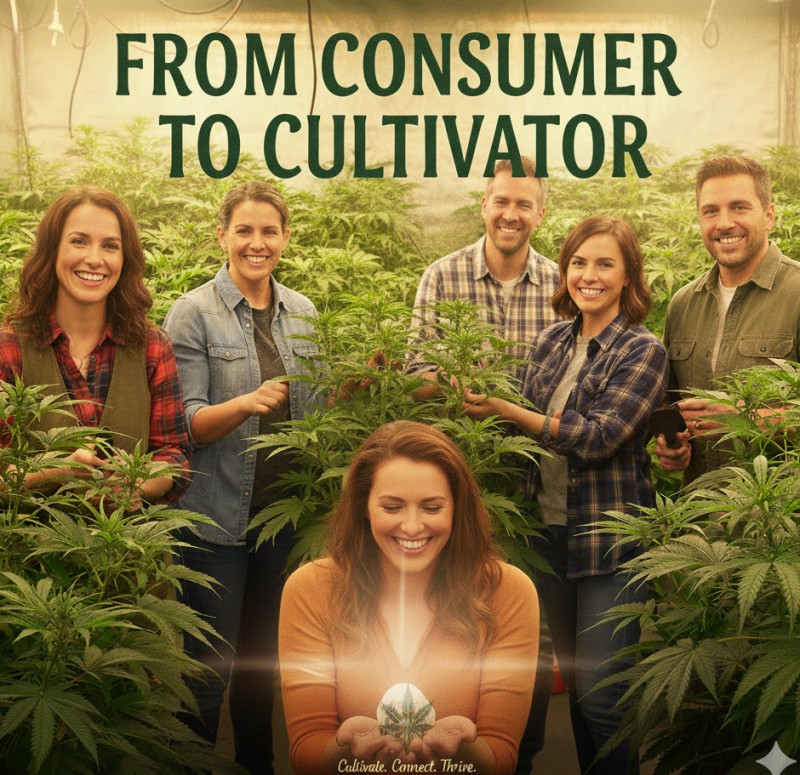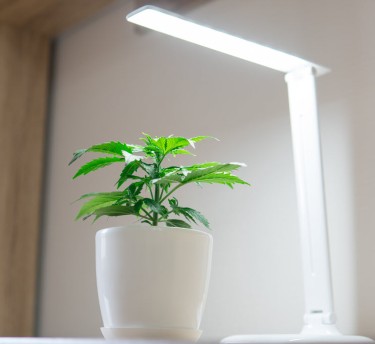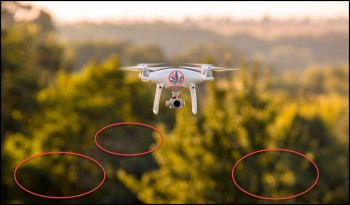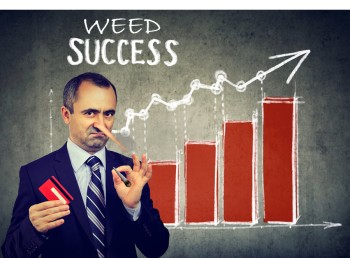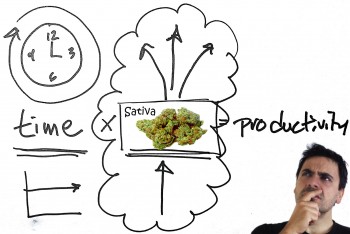From Consumer to Cultivator: Why Growing Your Own Cannabis Will Transform Your Relationship with the Plant
Walk into any dispensary today and you'll be bombarded with options that would make your head spin faster than a top-shelf indica. Purple Monkey Ball Wrecker crossed with Unicorn Tears at 35% THC? Sure, why not. Gummy bears that'll send you to another dimension? They've got those too. We've entered an era of cannabis hyper-consumerism where brands are locked in an arms race to create the most potent, most exotic, most Instagram-worthy products possible.
But here's the thing that's been gnawing at me: in our rush to out-high each other, we're losing something fundamental. We're treating cannabis like just another commodity to consume rather than the remarkable plant medicine it actually is. Worse yet, all this cloning and cross-breeding is causing us to lose precious genetic material that's taken millennia to develop.
As I've watched this industry explode over the past decade, I can't help but feel we've gotten a bit lost in the sauce. Don't get me wrong – I'm not against innovation or potent cannabis. But when I see people treating weed like they're collecting Pokémon cards, grabbing whatever's newest or strongest without any real connection to what they're consuming, it makes me wonder if we've missed the point entirely.
That's why I believe more cannabis users need to get their hands dirty – literally. Home cultivation isn't just about saving money or ensuring quality (though those are nice perks). It's about fundamentally transforming your relationship with cannabis from a mindless consumer transaction to a meaningful partnership with a living plant.
When you grow your own cannabis, something profound happens. You become part of the process rather than just the end user. You witness the magic of seed to harvest, you develop patience, you gain respect for the plant's complexity, and most importantly, you begin to understand that cannabis isn't just some product to be consumed – it's a living entity that deserves reverence.
In this article, we're going to explore why I believe home cultivation is the antidote to cannabis hyper-consumerism and how growing your own can turn you from a mere buyer into a guardian of this ancient plant's legacy.
Becoming a Cannabis Historian: The Preservation Imperative
When I tell people they should consider themselves cannabis historians rather than just growers, I get some puzzled looks. But hear me out – that's exactly what you become when you decide to preserve genetics through home cultivation.
We're living through what I call the "great genetic squeeze" of cannabis. As commercial operations focus on crowd-pleasing hybrids and clone-only cuts, we're systematically losing the building blocks that made modern cannabis possible. Those old landrace strains from Afghanistan, Thailand, Colombia, and Jamaica? Many are disappearing faster than you can say "Purple Gorilla Glue."
This isn't just botanical nostalgia – it's a genuine crisis. Every time we lose a genetic line, we lose potential medical applications, unique terpene profiles, and adaptation traits that took thousands of years to develop. It's like burning down a library, except this library contains the genetic code for medicines we haven't even discovered yet.
Here's where home growers become the heroes of this story. When you choose to grow out and preserve seeds from classic strains, you're not just gardening – you're performing an act of conservation. You're ensuring that future generations will have access to the genetic diversity that makes cannabis such a remarkable plant.
I've seen dedicated home growers maintain pure Afghani lines, original Thai sticks genetics, and Colombian Gold that would otherwise be lost to the sands of time. These aren't just plants in their garden; they're living museums. Every seed they preserve is a piece of cannabis history that could hold the key to future breakthroughs.
The process itself is deeply rewarding. Growing for seed preservation requires patience and attention to detail that commercial operations often can't afford. You learn to read the subtle differences between phenotypes, to select for traits beyond just potency, and to understand the plant on a level that goes far beyond what any dispensary experience can offer.
But here's what really gets me excited: when more home growers embrace this preservationist mindset, we create a distributed network of genetic guardianship. Instead of relying on a few large companies to maintain genetic diversity, we have thousands of passionate cultivators each holding pieces of the puzzle.
Think about it – if every serious cannabis user grew out just one classic strain and saved seeds, we'd have an incredible genetic safety net. We'd be insurance against corporate consolidation, natural disasters, and the homogenization that comes with mass production.
This isn't about being anti-progress or rejecting new genetics. Modern hybrids have given us incredible medical applications and refined experiences. But without preserving the foundational genetics that made these advances possible, we're building our future on an increasingly narrow base.
So when you're deciding what to grow in your first garden, consider choosing something with history. Grab some Afghani #1, some Acapulco Gold, or Thai stick genetics. You might find that growing these classics not only connects you to cannabis culture's roots but also produces experiences that today's hyper-bred varieties simply can't replicate.
The Alchemy of Respect: How Production Transforms Consumption
There's something almost mystical that happens when you transition from buyer to grower. I've watched it occur dozens of times with friends who decided to try their hand at cultivation, and I experienced it myself years ago. The moment you become responsible for a cannabis plant's entire lifecycle, your relationship with the final product fundamentally shifts.
When you buy cannabis from a dispensary, it's a simple transaction. You exchange money for a product, much like buying any other consumer good. But when you've spent months nurturing a plant from seed or clone, watching it develop, troubleshooting problems, and carefully timing the harvest – that changes everything.
First, there's the time investment. Growing quality cannabis requires patience that our instant-gratification culture rarely demands. You can't rush flowering, you can't force a plant to grow faster, and you can't skip steps in the curing process without consequences. This enforced patience begins to shift your mindset from the "I want it now" mentality of consumerism to something more contemplative and respectful.
Then comes the labor of love – and I do mean labor. Trimming by hand for hours, learning to read the subtle signs of nutrient deficiency, dealing with pest problems, monitoring pH levels – all of this work creates an intimate connection with the plant that simply can't be purchased. When you finally smoke cannabis you've grown yourself, you're not just consuming THC and terpenes; you're experiencing the culmination of months of care and attention.
This transformation in relationship manifests in how you actually consume. I've noticed that home growers tend to smoke less but enjoy it more. When you know exactly how much effort went into producing each bud, you don't waste it. You become more mindful about when and why you're consuming. The casual, mindless smoking that characterizes much of modern cannabis use gets replaced by intentional sessions that honor the process.
There's also something profoundly grounding about the entire growing process. In our increasingly digital world, caring for living plants connects us to natural cycles and rhythms that modern life often obscures. You become attuned to seasons, to the subtle changes in your plants' needs, and to the patience required for natural processes to unfold.
But perhaps most importantly, growing your own cannabis forces you to confront why you're using it in the first place. When consumption requires months of planning and effort rather than a quick trip to the dispensary, you start asking deeper questions. Are you using cannabis as a crutch to avoid dealing with problems? Are you consuming out of habit rather than intention? Or are you genuinely using it as a tool for wellness, creativity, or spiritual exploration?
This self-reflection often leads to more balanced and purposeful use. Instead of reaching for the strongest product available, you might find yourself appreciating the subtle differences between phenotypes you've grown. Instead of chasing the next new strain, you develop relationships with specific plants and their unique characteristics.
The alchemy isn't just in transforming plant matter into medicine – it's in transforming yourself from a passive consumer into an active participant in one of humanity's oldest agricultural relationships.
Planting Seeds of Change
As I reflect on the current state of cannabis culture, I can't help but feel we're at a crossroads. We can continue down the path of hyper-consumerism, treating cannabis like just another product to be bought, consumed, and forgotten. Or we can reclaim our relationship with this remarkable plant through the simple act of growing our own.
Home cultivation isn't just about producing personal cannabis – it's about becoming stewards of a living tradition that spans millennia. When you choose to preserve genetics, you're ensuring that future generations will have access to the full spectrum of cannabis's potential. When you transition from consumer to producer, you develop the kind of respectful relationship with the plant that our ancestors understood intuitively.
The beauty of this transformation is that it doesn't require everyone to become master cultivators. Even growing a single plant can shift your perspective dramatically. That first successful harvest, that first time you smoke something you've grown yourself, that moment when you realize you've become part of cannabis history rather than just its end user – these experiences change you.
We don't need fewer cannabis options or less innovation. But we do need more people who understand that cannabis is more than just a commodity. We need gardeners who double as historians, consumers who think like conservationists, and users who approach this plant with the reverence it deserves.
So consider this your invitation to get your hands dirty. Plant some seeds – literally and figuratively. Your relationship with cannabis will never be the same, and the plant itself will be better off for it.
